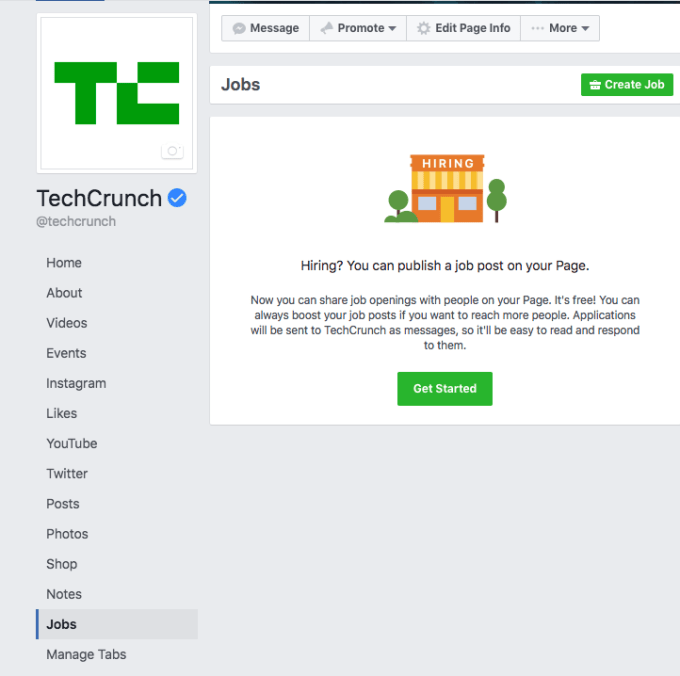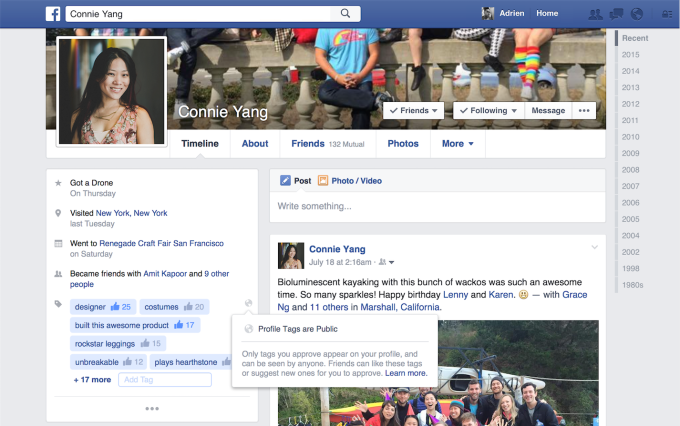chevron_left
-
play_arrow
NGradio So good... like you
share
close
Facebook might muscle-in on LinkedIn’s recruiting business with ways for business Pages to promote job listings. The new Jobs features could give companies another reason to drive traffic to their Facebook Page beyond marketing their products in the News Feed, while also allowing them to pay the social network to get their open position in front of more candidates.
Today TechCrunch spotted a Jobs tab on its Page, and now Facebook confirms it’s experimenting with a slew of recruiting features. A Facebook spokesperson tells me, “Based on behavior we’ve seen on Facebook, where many small businesses post about their job openings on their Page, we’re running a test for Page admins to create job postings and receive applications from candidates.”
The new features could compete with LinkedIn, as well as developers like Work4, Workable and Jobscore that build “Jobs” tab applications that businesses can embed in their Facebook Pages. Perhaps Facebook was prepping for these new features when it tested Profile Tags last year that mimic LinkedIn’s endorsements feature.

A new Facebook option in the status update composer allows Pages to formally share a job opening with related details like job title, salary or if it’s full-time versus part-time. The special formatting could differentiate job postings from other content and attract eyeballs amongst the crowded News Feed.
These job postings will also show up in a Jobs tab of the Page, creating a dedicated landing place where companies can send job seekers. Businesses would get the added benefit of potentially gaining new followers whether or not someone inquires about the open position, compared to a relatively static Careers page on a company’s website.
Job postings will include an “Apply Now” button that launches a standard job application flow, but pre-populated with information from a user’s public profile. That could help people quickly apply for multiple jobs without typing in redundant information.
Submitted applications will be received by the Page as a Facebook Message. Though this could bolster Facebook’s push to get businesses using its chat feature, it also might be clumsy for companies to mix job applications in with the customer support requests they typically get via Facebook messages. The potential option to forward job applications to the email address of the company’s recruiter might work better.
Businesses will also be able to pay to show their News Feed job postings to more people, directly competing with some of LinkedIn’s ad offerings. Facebook’s opportunity here combines its ubiquitous reach, personal data and engagement.

Facebook added Profile Tags last year, which are similar to LinkedIn’s endorsements
Pretty much everyone has a Facebook profile, which are often filled with extensive information about their past jobs titles, employers, education and interests. Recruiters can target job posting ads with all this data so they reach people with the right credentials. And because people browse Facebook constantly, those users are likely to eventually see the ads.
For comparison, not everyone has a LinkedIn profile. It has 467 million members compared to the 1.79 billion on Facebook. Many LinkedIn users only visit when they’re updating their profile about a new job, or are actively looking for one. But Facebook could reach people not even thinking about a job, yet could be convinced to apply for the chance at a higher salary.
That’s the same reason Facebook has been able to build giant brand and performance advertising businesses despite Google’s traditional dominance. You might search on Google when you know what you want to buy, or on LinkedIn if you know you want a job, and their ads can help with demand fulfillment. Facebook offers demand generation, drumming up interest people didn’t know they had.
With Microsoft’s $26.2 billion cash acquisition of LinkedIn expected to go through soon, Facebook may be looking to capitalize on the confusion or product stagnation.
Source: techcrunch.com
Written by: New Generation Radio
Rate it
Similar posts
ΔΗΜΟΦΙΛΗ ΑΡΘΡΑ
COPYRIGHT 2020. NGRADIO





















Post comments (0)